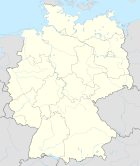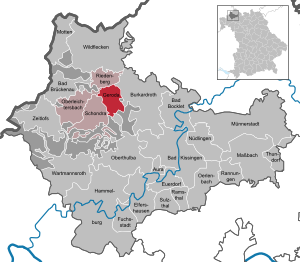Geroda (Lower Franconia)
| coat of arms | Germany map | |
|---|---|---|

|
Coordinates: 50 ° 17 ' N , 9 ° 54' E |
|
| Basic data | ||
| State : | Bavaria | |
| Administrative region : | Lower Franconia | |
| County : | Bad Kissingen | |
| Management Community : | Bad Brueckenau | |
| Height : | 442 m above sea level NHN | |
| Area : | 16.8 km 2 | |
| Residents: | 799 (Dec. 31, 2019) | |
| Population density : | 48 inhabitants per km 2 | |
| Postal code : | 97779 | |
| Area code : | 09747 | |
| License plate : | KG, BRK, HAB | |
| Community key : | 09 6 72 126 | |
| Market structure: | 3 districts | |
Market administration address : |
Kirchberg 2 97779 Geroda |
|
| Website : | ||
| Mayor : | Alexander Schneider ( FWG ) | |
| Location of the Geroda market in the Bad Kissingen district | ||
Geroda is a market in the Lower Franconian district of Bad Kissingen .
geography
Geographical location
Geroda is located in the Bavarian Rhön Nature Park , in the Thulbatal , on the southern foothills of the so-called Black Mountains .
Community structure
Geroda is divided into three districts:
- Geroda
- space
- Seifertshof
history
The welcome sign at the entrance to the village already gives it away: The place "Geroda" is first mentioned in 1167 as "Gerrode", which can be translated into New High German as "clearing of Gero". Since Geroda is not mentioned in the official documents before this first documentary mention, the place was probably not created until around 1150. After 1167, Brend built a chapel in Geroda.
The rule of the von Bibras and the Reformation
In 1327 the nobleman Kaspar von Bibra bought half of Geroda and other places in the area as a fief from the diocese of Würzburg. The place then remained in the hands of the Bibra family for a long time. In the age of the Reformation it was probably only Hans von Bibra (died 1581) who accepted the Protestant faith, even if his father Georg von Bibra (died 1549) was friendly towards the Lutheran. Presumably the introduction of the Reformation in Geroda can be set for the year 1550. In 1606 the von Bibras had to sell their possessions in Geroda due to debts. Most of the town was now sold to the von der Tann family.
The rule of the von der Tanns and the Thirty Years War
The village, which now belongs to the von der Tann family, was massively affected by armies moving through during the Thirty Years' War 1618-1648. After the war there were disputes between the Protestant feudal takers von der Tann and the Catholic diocese of Würzburg as the feudal giver about sovereignty over the place. Only a lawsuit before the Imperial Court of Justice on April 28, 1666 brought the certainty that the noble family von der Tann will remain the owners of the place in accordance with the Peace of Westphalia - which means that the place has now retained the Protestant faith.
Geroda in its long 18th century
Between the 1680s and the "French Era" of the 1790s, Geroda repeatedly became the quarter of armies moving through, which pushed the town to its financial and civilizational limits.
In 1692 Heinrich von der Tann sold the place to the Catholic diocese of Fulda, but forgot to regulate spiritual matters in the contract. Even if this was made up for in 1698 in favor of the Lutherans, this previous lack of clarity remained the reason for the disputes throughout the 18th century: The Catholic fiefdom Würzburg and his Catholic fiefdom Fulda stood up against the Protestant von der Tann family, which at the time of the Peace of Westphalia ruled the worldly.
From 1797 to 1802 the von der Tanns negotiated most of their (legal) fiefdom with Würzburg because they were tired of the eternal quarrel. In May 1802 Geroda was then both spiritually and secularly Catholic property. But already in October 1802 the Catholic diocese of Fulda lost all of its secular property in Geroda to the Hereditary Prince of Orange Nassau. After another brief reign of Napoleon (1806-1815) Geroda came to Bavaria in 1816.
19th and 20th centuries
In the war of 1866 between the German Empire and Austria, Geroda almost became the scene of a battle, but the Bavarian artillery did not reach the nearby village of Platz in time, which is why the clash between Bavarian and Prussian troops did not take place until Kissingen.
Between 1911 and 1915, Geroda and Platz were probably struck by a fire devil: On July 16, 1911, more than a third of the market in Platz was cremated, 23 houses with 34 apartments were destroyed, people or cattle were not harmed. On December 31, 1914, the Geroda iron forge burned down. On January 4, 1915, the Geroda flames stole three barns and the shingle roof of the church tower. In 1920 the new church tower roof was inaugurated. During the Weimar Republic, from 1928 onwards, under the direction of Pastor Hans Schödel, infrastructure measures were carried out that lasted until 1940. A memorial was erected to the leader in the southeast of the community.
Jewish families had lived in the village since at least the 19th century , and in 1907 they built a synagogue . This was devastated by SA men during the November pogrom in 1938 , as a memorial plaque commemorates. In 1910 the Jewish cemetery was established.
Incorporations
In the course of the Bavarian community reforms, the market rights of the former market square were transferred to the new community of Geroda on July 1, 1971 (the day of incorporation).
politics
The community is a member of the Bad Brückenau administrative community .
Market council
In the local election on March 15, 2020 , only the nomination of the Independent Voting Association Geroda / Platz, which received all eight mandates, was presented.
In the term of office from 2014 to 2020, the municipal council was composed as follows:
- Free community of voters Geroda: 2 seats
- Non-party voter community Place: 2 seats
- Independent voter community Geroda / Platz: 4 seats (plus 1st mayor)
mayor
Alexander Schneider has been the first mayor since May 1, 2014; this was elected on March 15, 2020 with 96.1% of the votes for a further six years. His deputies are Steffen Schneider (Second Mayor) and Fred Hilsdorf (Third Mayor).
coat of arms
Blazon
| Blazon : “Through a curled silver tip, inside a floating black paw cross, split by blue and red; in front a silver oblique left bar covered with three blue rings, behind a curved silver fish. " | |
Coat of arms history
In 1971 the Geroda market was formed from the former municipality of Geroda and the market square. Geroda belonged to the Fulda Abbey until 1803, as indicated by the Fulda cross on the coat of arms. The market square, however, belonged to the Würzburg monastery. The manorial power in both communities lay with the Würzburg Juliusspital. This initiated the market survey of the municipality of Platz in 1802. In the coat of arms, the silver sloping blue bar with the three blue rings indicates the Juliusspital. The coat of arms of the hospital is also the coat of arms of its founder, Bishop Julius Echter von Mespelbrunn (1573–1617). The silver fish is taken from the family coat of arms of the Barons von der Tann. The coat of arms was awarded by the government of Lower Franconia on December 10, 1980.
Culture and sights
Architectural monuments
Soil monuments
Museums
- Christina Dietrich and Karl Engelhardt's private museum
Regular events
- The Geröder Droohdeseldour and the Geröder Walking Lauf take place in mid-June .
- The Geröder Kirchweih takes place on the third weekend in October. The fair is organized by the Kirmesgesellschaft Geroda-Platz e. V. organized and celebrated with traditional folk dances and a church parade.
Web links
Individual evidence
- ↑ "Data 2" sheet, Statistical Report A1200C 202041 Population of the municipalities, districts and administrative districts 1st quarter 2020 (population based on the 2011 census) ( help ).
- ↑ All places in the municipality of Geroda. In: Bayerische-Landesbibliothek-Online.de. Retrieved September 5, 2018 .
- ^ Reitzenstein, Wolf-Armin von .: Lexicon of Franconian place names: origin and meaning; Upper Franconia, Middle Franconia, Lower Franconia . Beck, Munich 2009, ISBN 978-3-406-59131-0 .
- ↑ Hans Schödel: History of the parish Geroda- place. A contribution to local history. Brückenau 1927, p. 6-7 .
- ↑ Hans Schödel: History of the parish Geroda- place. A contribution to local history. Brückenau 1927, p. 8-11 .
- ↑ Hans Schödel: History of the parish Geroda- place. a contribution to local history. Brückenau 1927, p. 13-15 .
- ↑ Hans Schödel: History of the parish Geroda- place. A contribution to local history. Brückenau 1927, p. 18 .
- ↑ Hans Schödel: History of the parish Geroda- place. A contribution to local history. Brückenau 1927, p. 31 .
- ↑ Hans Schödel: History of the parish Geroda- place. A contribution to local history. Brückenau 1927, p. 19-20 .
- ↑ Hans Schödel: History of the parish Geroda- place. A contribution to local history. Brückenau 1927, p. 30 .
- ↑ Hans Schödel: History of the parish Geroda- place. A contribution to local history. Brückenau 1927, p. 34 .
- ↑ Hans Schödel: History of the parish Geroda- place. A contribution to local history. Brückenau 1927, p. 34 .
- ↑ Hans Schödel: History of the parish Geroda- place. A contribution to local history. Brückenau 1927, p. 36-38 .
- ↑ Hans Schödel: History of the parish Geroda- place. a contribution to local history. Brückenau 1927, p. 41-42 .
- ↑ Ludwig Lechner: Commercial route construction in the Rhön . Ed .: Adolf Hergenröder. Berlin / Nuremberg 1934, p. 6 .
- ↑ Memorial sites for the victims of National Socialism. A documentation, volume 1. Federal Agency for Civic Education, Bonn 1995, ISBN 3-89331-208-0 , p. 142
- ^ Wilhelm Volkert (ed.): Handbook of Bavarian offices, communities and courts 1799–1980 . CH Beck, Munich 1983, ISBN 3-406-09669-7 , p. 426 .
- ↑ 2020 municipal council election , accessed on June 22, 2020
- ↑ Politics. Municipality of Geroda (Lower Franconia), accessed on July 19, 2020 .
- ^ Entry on the coat of arms of Geroda (Lower Franconia) in the database of the House of Bavarian History
- ^ Stephanie Elm: Small private museum in Geroda. In: Saale-Zeitung (inFranken.de). September 2, 2018, accessed September 5, 2018 .




